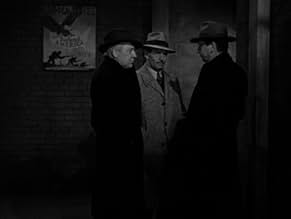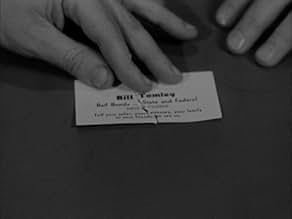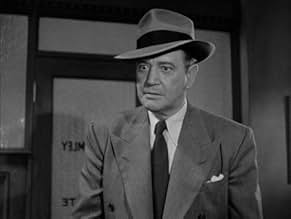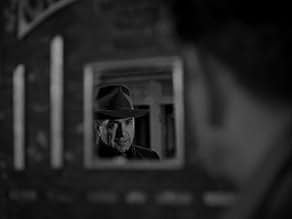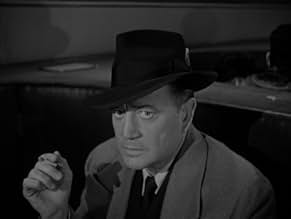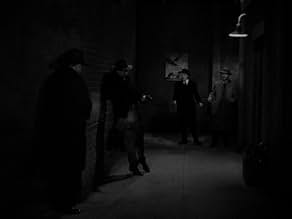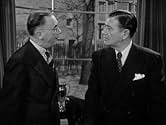IMDb RATING
6.3/10
1.3K
YOUR RATING
A depressed man hires an assassin to kill him when he least expects it, but when his life takes an upward turn, he finds he now wishes to live.A depressed man hires an assassin to kill him when he least expects it, but when his life takes an upward turn, he finds he now wishes to live.A depressed man hires an assassin to kill him when he least expects it, but when his life takes an upward turn, he finds he now wishes to live.
- Director
- Writers
- Stars
Trevor Bardette
- The Bum in the Next Bed
- (uncredited)
William 'Billy' Benedict
- The Deafmute
- (uncredited)
Willie Bloom
- Bum
- (uncredited)
Roy Brent
- Detective in Alley
- (uncredited)
Charles Coleman
- Jennings the Butler
- (uncredited)
Clancy Cooper
- Telephone Repairman
- (uncredited)
Don Costello
- Lefty Vigran aka Gorss
- (uncredited)
Russell Custer
- Bar Patron
- (uncredited)
Ralph Dunn
- Cop at Car Accident
- (uncredited)
Otto Forrest
- The Whistler
- (uncredited)
Byron Foulger
- Flophouse Desk Clerk
- (uncredited)
John George
- Bum
- (uncredited)
Dick Gordon
- Tomley's Assistant
- (uncredited)
Robert Homans
- Dock Watchman
- (uncredited)
- Director
- Writers
- All cast & crew
- Production, box office & more at IMDbPro
Featured reviews
Fans of the radio series will not be dissapointed by this little gem of a thriller. Richard Dix gives a great performance as a man who puts a contract out on his own life. He is upset because he has not gotten over his wife drowning in the Pacific Ocean on a vacation three years ago. He then gets a wire saying his wife is alive, will be home soon, and now has to hurry and stop the contract. The only thing this was missing that was common in the radio play was a suprise ending. Very often in the radio series, it was never a question of whodunit, as it was often told through the killer's point of view, but it was how they were going to trip themselves up or get caught. And it was always with a twist.
This unusual Film Noir (the only one ever to be made into a whole series of films) certainly catches the sinister atmosphere of its genre, both visually with very well done shadow effects and the adequate 'cheap' harbor surroundings of a B movie, and thematically, using a lot of psychology which doesn't fail to have its effects, neither on the protagonists nor on the audience - but just a little bit of an overdose of the belief in 'destiny'...
Whose destiny is it to live or to die? Who has a 'right' to live or to die? Questions like these are maybe somehow out of place in a Film Noir - because they've got too much to do with morality. The Noir world (at least that of the 40s) is usually quite immoral (see "The Maltese Falcon", "The Shanghai Gesture", "Gilda"); and it's not always the good ones who get away - that's the cynical Noir philosophy...
But anyway, "The Whistler" still remains an enormously suspenseful film with a very capable cast and direction; and a 'must' for every fan of classic crime.
Whose destiny is it to live or to die? Who has a 'right' to live or to die? Questions like these are maybe somehow out of place in a Film Noir - because they've got too much to do with morality. The Noir world (at least that of the 40s) is usually quite immoral (see "The Maltese Falcon", "The Shanghai Gesture", "Gilda"); and it's not always the good ones who get away - that's the cynical Noir philosophy...
But anyway, "The Whistler" still remains an enormously suspenseful film with a very capable cast and direction; and a 'must' for every fan of classic crime.
I watched this last night on TCM and found it not only thoroughly entertaining but a textbook example of how a B-grade picture from a poverty row studio could rise above its budget limitations thanks to the efforts of a clever director (William Castle) and strong players (Richard Dix and J. Carroll Naish in particular). Superior in some respects to entries in parallel series based on radio programs (like Universal's Inner Sanctum with Lon Chaney, Jr.), perhaps the most appealing aspect of "The Whistler" is the economy with which the story is told. There are no needless lines, no needless scenes. Whether it belongs within the "noir" cycle is a matter to be debated, but nevertheless "The Whistler" has its share of the quirky characters and shadowy settings that typify that genre, not to mention the creepy portrayal by Naish of a hit-man who reads a monograph on "necrophobia" in his spare time.
Solid, low-budget film noirish yarn about a man who takes out a contract on himself and then through a reversal of fortune decides against it. The Whisteler open up the film with that delightfully creepy little tune and a brief narrative and the reigns are handed over to a competent corp of character actors(and Richard Dix and Gloria Stuart). Dix plays the lead well-enough though incredibly lethargically. He literally looks like he hasn't slept in days. Stuart is peppy and pretty in a smallish role, but J. Carrol Naish does an outstanding job as the contracted killer. He gives a layered performance is what was a truly difficult role. The film barely spans an hour and ten minutes or so but never lags. we get suspense, action, and answers rather quickly. The Whistler has a much more subdued role then what you would hear in the radio series. This film would go on to spawn many sequels and was one of the earliest directorial forays of horror icon William Castle. Castle, as always, does a more than workmanlike job.
Before he became a producer and conjured up all those publicity gimmicks for his cheesy horror pictures, William Castle churned out a series of nifty little pictures as a director for Harry Cohn's B unit -- including the immortal "When Strangers Marry". "The Whistler" is a clever noir that tackles the old premise of a despondent man hiring a contract killer to murder him, only to change his mind later. Castle provides a higher standard of mise-en-scene than in most pictures of this ilk, with nice camera movement and grungy, realistic sets. The absurd plot twists and lapses of logic stretch credulity to the utmost -- but that's one of the "beatitudes of the B's" (as Andrew Sarris would say). It's surprising that Cornell Woolrich was not the original author, so close is the atmosphere to his oeuvre. Dix is a bit of a cipher, but Naish is as compelling as always in another offbeat role as the philosophical hit man who suffers from fear of death; plus there are plenty of familiar faces in minor roles. The mysterious omniscient Whistler narrator is effective, if somewhat underused here. Castle went on to direct two even better entries in the series.
Did you know
- TriviaFirst of eight entries in the "Whistler" series, released from 1944 to 1948, and Richard Dix appeared in all but the last one. Unusually, he played a different character in each.
- GoofsWhile the killer is lying on the bed perusing his book on Fear of Death, a cigarette suddenly appears in his mouth.
- Quotes
The Bum in the Next Bed: Rats in this place as big as beavers. They won't hurt ya... but you're liable to trip over them in the dark.
- ConnectionsFeatured in Spine Tingler! The William Castle Story (2007)
Details
- Runtime59 minutes
- Color
- Aspect ratio
- 1.37 : 1
Contribute to this page
Suggest an edit or add missing content


